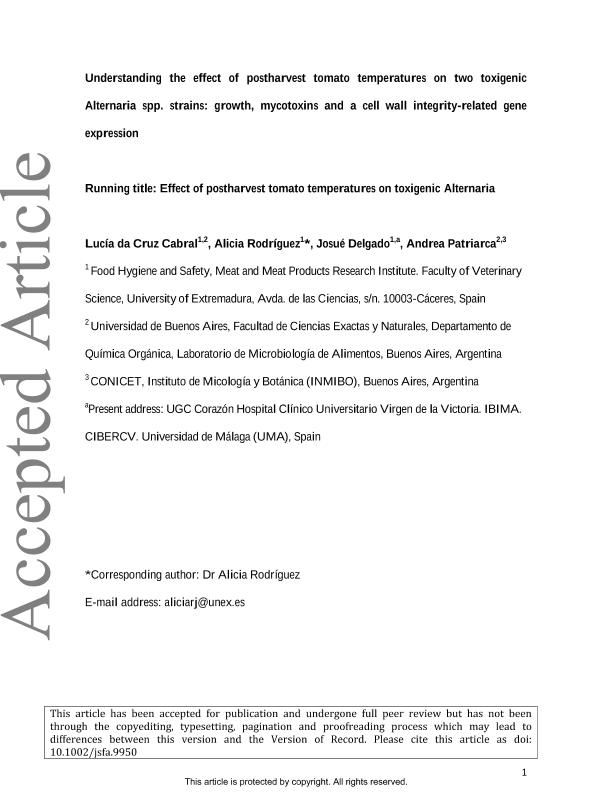Artículo
Understanding the effect of postharvest tomato temperatures on two toxigenic Alternaria spp. strains: growth, mycotoxins and cell-wall integrity-related gene expression
Fecha de publicación:
12/2019
Editorial:
John Wiley & Sons Ltd
Revista:
Journal of the Science of Food and Agriculture
ISSN:
0022-5142
Idioma:
Inglés
Tipo de recurso:
Artículo publicado
Clasificación temática:
Resumen
BackgroundTomato fruits are susceptible to Alternaria spp. spoilage. A correct postharvest management is necessary to prevent mould growth and mycotoxin accumulation, being the temperature one of the main factors. The effect of different postharvest temperatures (5, 12, 25 and 35 °C) on growth, mycotoxin production and a stress-related gene expression by two Alternaria spp. was assessed. ResultsGrowth rates decreased rapidly when temperature was higher than the optimum (25 °C), while a gradual reduction was detected at lower temperatures. Tenuazonic acid (TeA) was strongly synthesised at all temperatures evaluated, with a maximum between 12 and 25 °C. Alternariol monomethyl ether (AME) was produced only at the two lowest temperatures; with a peak at 12 °C. Regarding the expression of the stress-related RHO1 gene, during active fungal growth both Alternaria spp. showed more copies of the gene as temperature increased. At the stationary phase, the RHO1 gene expression was significantly higher at 12 °C, coinciding with AME highest accumulation. ConclusionChanges on temperatures related to different postharvest stages of tomato fruits markedly affect toxigenic Alternaria spp. The highest levels of both mycotoxins were recorded at 12 °C, a common storage temperature for tomato fruit. Additionally, an association between alternariols biosynthesis and the cell wall integrity pathway was noticed in relation to temperature, suggesting that temperature may act as stressor stimulating the RHO1 gene expression, which in turn triggers this mycotoxin synthesis. These results will be useful in developing new strategies to efficiently control Alternaria spoilage in tomato fruit and by-products.
Archivos asociados
Licencia
Identificadores
Colecciones
Articulos(IEGEBA)
Articulos de INSTITUTO DE ECOLOGIA, GENETICA Y EVOLUCION DE BS. AS
Articulos de INSTITUTO DE ECOLOGIA, GENETICA Y EVOLUCION DE BS. AS
Citación
Da Cruz Cabral, Lucía Mariana; Rodríguez, Alicia; Delgado, Josué; Patriarca, Andrea Rosana; Understanding the effect of postharvest tomato temperatures on two toxigenic Alternaria spp. strains: growth, mycotoxins and cell-wall integrity-related gene expression; John Wiley & Sons Ltd; Journal of the Science of Food and Agriculture; 99; 15; 12-2019; 6689-6695
Compartir
Altmétricas




